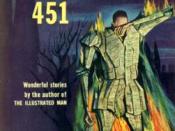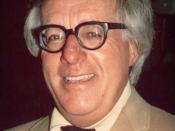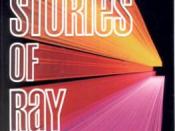Fahrenheit 451 was written by Ray Bradbury in the early years of the Cold War. Back then, times were changing quickly and society as a whole had a drastic modernization and remodeling. Ray Bradbury felt that society was becoming broken, not as wholesome and respectable like before. Therefore, his book was a critique on society at the time, and it showed his feelings and thoughts of it. The people and civilization at that time was focused on their own happiness, absorbed in their technology. Their main goals in life were to be happy and not have to do anything. MontagÃÂs wife was a prime example. She was lost in her world of technology, from watching the TV to listening to the radio. Even Montag began to realize how ÃÂdeadÃÂ she was, because thatÃÂs all that she did. Ray Bradbury probably saw all the new technologies and new ideas surfacing during the Cold War due to the competition between the United States and the Soviet Union as unnecessary, and so in his novel he included how the technology left people no time for books and spending all their time on their gadgets and gizmos.
In real life today, we do have technology everywhere. That is a fact of life, and it would be hard for many of us to survive. We rely on things like the TV and the computer to provide us entertainment, and most people today consider reading as ÃÂboringÃÂ or optional. Although our technology today is not as sophisticated as it is in BradburyÃÂs novel, we do have many of the items mentioned. We have radio 24/7, and while not everyone has huge wall TVÃÂs, you can find a television is almost every household. People in Fahrenheit 451 would define luxury as 4 or more wall-circuits, which are the TVÃÂs that take up entire walls. They would watch TV or listen to the radio all day, without having to interact with anyone or do any work. That is semi-true for the world of today. I know many people who would love to stay home and do whatever they want, but I can guarantee that they would get bored eventually. That is one difference we have. Mildred Montag listens to the radio and watches the TV all day, everyday. She loves it, and begs Montag to get the 4th wall installed, even though it costs 1/3 of his yearly pay. She does not realize how big of a chunk that is, she just wants more. People today do spend a lot of money on technology, but most people would want to go outside eventually. The people in BradburyÃÂs futuristic world do not realize how unhappy they are, because they are too engrossed in their technology. They think that they are happy, but are ignorant to the bleakness and blandness their lives consist of. That could also hold true for the people of today. Many people are content with what they have, but it is not always good to be content. Complacency ruins many things, and in todayÃÂs world, it would not allow you to survive.
The women in Fahrenheit 451 are dependent on their husbands. That is modeled after how it was back then, because most women were probably still housewives back then. Ray Bradbury probably assumed that women would, for the most part, remain housewives. For example, Mildred, Mrs. Bowles, and Mrs. Phelps all are housewives. They stay at home and use their technology to attain joy. Their lives are empty, and none of them realize it. Montag realizes that he does not really love Mildred anymore, because of her lack of emotion and ignorance to the world. Today, most women do have jobs. They are more independent than the housewives of the olden days. However, there are still many housewives around the world, with some countries even forbidding women to leave the house or show their faces. Montag, who began to steal books, once read a poem to Mildred and her friends. It shocked them, and Mrs. Phelps becomes overwhelmed with emotion that she had never experienced before. That displays how their lives are so restrained by technology, that they do not really experience the upÃÂs and downÃÂs of life. It opened their eyes to the censorship and things that have been concealed, which makes them feel quite strange.
ÃÂHappy! Of all the nonsense.ÃÂ (pg 10) Clarisse, the neighbor girl, had a conversation with Montag, and ended with her asking him if he was truly happy. At first, he considers it as a silly question, because of course he was happy. But, the question makes him think and wonder. He tells himself he is happy, but as he envisages it, he grasps the knowledge that he is actually not. He is discontent with his life, and with Clarisse opening his mind, he becomes knowing of that fact. He finally sees the blindness of society, and is uncomfortable with it. Even though they only had a quick conversation, it affects him in many ways. Her strange and new nature sharpened MontagÃÂs view of the government and society he lived in. He knows it is strange, but cannot help but to think about it all and ask questions. That could be a familiar predicament for many people today. People like to think and tell themselves along with others that they are happy, but are they really? It is easy to say, but not necessarily easy to achieve. Some people may be able to be happy more often than others, and quality of life may vary from place to place, but it is looked down upon if you are a generally unhappy person. People also have conversations that show them the truth every day, because it may have been something they previously overlooked, or were just told to believe.
ÃÂColored people donÃÂt like Little Black Sambo. Burn it. White people donÃÂt feel good about Uncle TomÃÂs Cabin. Burn it. SomeoneÃÂs written a book on tobacco and cancer of the lungs? The cigarette people are weeping? Burn the book.ÃÂ (pg 59) Beatty is lecturing Montag on WHY they burn books. It is all about censorship. If someone does not like a book, thatÃÂs their job to burn it. That is why they started, because the society feels that books poison and confuse the mind. They think books contradict each other, therefore they should not be read and in fact should be destroyed. It is all censored, because it may offend people or teach them things that the government does not want them to learn. A government like that is cruel, because it forces its people to be ignorant and unknowing. Today, we obviously read a lot of books. Books are censored thought, for example in public schools. Some books are banned from being reading material in schools because of their graphic content or the messages being conveyed through the book. But we usually do not burn books, although in some places book burning is actually going on. There is still plenty of censorship in our society, from TV to music to books, but it is not as heavy as the censorship featured in Fahrenheit 451.
Ray BradburyÃÂs futuristic novel was a trend-setter in many ways. It has inspired hundreds of stories, and has been shown in everything from games to movies to TV shows. Society today shares many of the shown disabilities in his book. Both worlds are obsessed with technology, and the ultimate goal in life is still to be happy. People do lie to themselves, because of ignorance, or intolerance. They could be scared to find the truth, and just plain do not want to know. Even if we do not really burn books and fireman FIGHT fires instead of starting them, we undoubtedly share many characteristics with Ray BradburyÃÂs world in Fahrenheit 451.
Bibliography"Fahrenheit 451 - Wikipedia, the free encyclopedia." Wikipedia, the free encyclopedia. 15 May 2009 .
Bradbury, Ray. Fahrenheit 451. New York: Del Rey, 1987.





